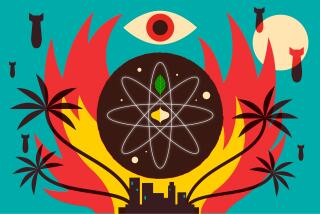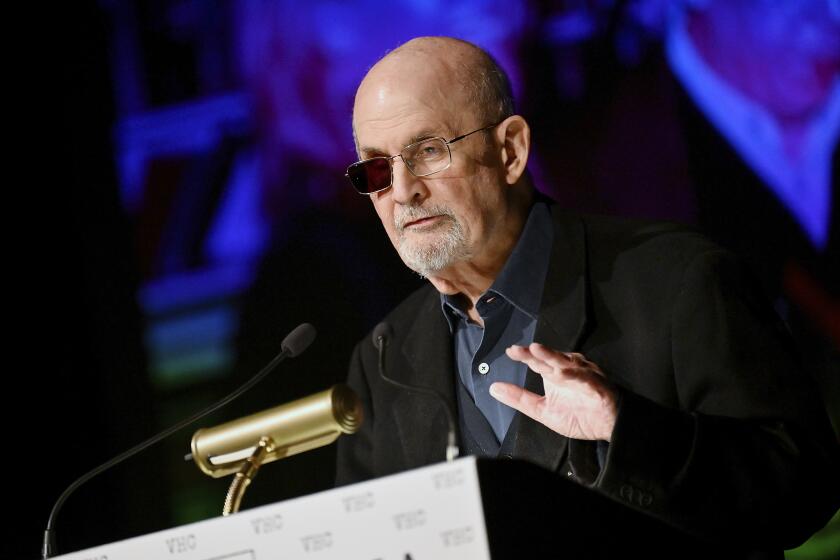Going the distance
How MANY athletic activities are as well-suited to the writing life as long-distance running? It’s cheap, for one -- writers are notoriously poor, and all you need to run is a good pair of sneakers. In a 1999 essay for the New York Times, Joyce Carol Oates drew a parallel between the tireless walker-writers of the 19th century (Coleridge, Dickens, Whitman) and the contemplative present-day jogger. “In running,” she wrote, “the mysterious efflorescence of language seems to pulse in the brain.” An afternoon run allows Oates to untangle the structural problems that bedevil her fiction in the morning.
Oates’ essay aside, the literature of running is as thin as a mesh singlet. Running pops up in fiction and poetry from time to time, from Homer to John Updike, but the sport doesn’t easily lend itself to the dramatic. The vagaries of weather, the joint pains and the repetition of putting one foot in front of the other can’t compete with the traded blows of the boxing ring or a home run.
The Japanese novelist Haruki Murakami has run nearly every day for the last 23 years and participates in at least one marathon a year. In his slim memoir, “What I Talk About When I Talk About Running” -- the title is a nod to Raymond Carver, one of the many American writers that Murakami has translated -- he narrates his origin story as a novelist and as a runner. In his 20s, he owned and operated a jazz club. While watching a baseball game, he decided, “out of the blue,” that he could write a novel. “Something flew down from the sky at that instant, and whatever it was, I accepted it.” After writing two books, he sold the club to devote himself to fiction -- his first novel to be translated into English, “A Wild Sheep Chase,” followed. As his writing career took off, his health began to decline -- the result of all that sitting and smoking. Murakami decided to take up running.
Murakami draws parallels between training for races and writing novels. Both are long-term projects during which you have to keep the end in sight. Running, like writing, isn’t really competitive -- each participant has a personal best. And the process of writing, like running, can be physically draining. Unlike Oates, however, Murakami doesn’t use running as space to think about writing. “Essentially I’m not thinking of a thing,” he writes. “All I do is keep running in my own cozy, homemade void.”
Most of “What I Talk About When I Talk About Running” traces a few months in late 2005 during which Murakami trained for the New York City Marathon. This training had followed a period when he stopped running seriously as his interest in other sports grew. (Strangely, Murakami jumps from the eve of the marathon to a triathlon nearly a year later, as if he’s changing the subject -- we learn later that he didn’t do so well in the race.) Each chapter finds him doing a practice run or a bike ride in Hawaii, Japan or Cambridge, Mass., wherever his schedule takes him. These training sessions are described at great, dozy length. “I never go cycling without a water bottle. As I’m cycling along, I take the bottle from its rack, gulp down some water, and return it” is a typical sentence.
Almost three decades later, Murakami dwells on the decrease in energy he feels as he reaches his late 50s. As a runner, he writes, he peaked in his late 40s, and his race times have gotten worse since. The word “accept” pops up repeatedly throughout the book. He can’t exercise as much as he used to, and his body isn’t as efficient, “but what’re you going to do? I just have to accept it.” He finds that after a race he succumbs to a mental lethargy he calls “runner’s blues.” All he can say about the phenomenon is, “That’s life. Maybe the only thing we can do is accept it.” At times, Murakami sounds like a Successories poster: “It doesn’t matter how old I get, but as long as I continue to live I’ll always discover something new about myself.”
Still, the grim shadow of aging hangs over the book.
Murakami writes that “What I Talk About” is “just a book in which I ponder various things and think out loud.” But despite its brevity, the volume feels padded. Two old magazine articles are planted in the text. There are repetitions, sometimes from one sentence to the next: “When I was young, I never imagined that the twenty-first century would actually come and that, all joking aside, I’d turn fifty. In theory, of course, it was self-evident that someday, if nothing else happened, the twenty-first century would roll around and I’d turn fifty.” At one point, describing the weather conditions of a race, Murakami goes off on a rather odious tangent about global warming. “There were torrential rains in parts of the country, and a lot of people died. They say it’s all about global warming. Maybe it is, and maybe it isn’t. Some experts claim it is, some claim it isn’t. There’s some proof that it is, some that it isn’t. But still people say that most of the problems the earth is facing are, more or less, due to global warming.”
The flat, colloquial style that serves to heighten the magical qualities of Murakami’s fiction makes this work of straightforward nonfiction sound pedestrian. Cliches abound: The heat of a city in summer is “something else,” squirrels run around “like crazy” and young Harvard students run “like the wind.” For a book by such a gifted writer, “What I Talk About When I Talk About Running” reads as though it could have been written by anyone. *
More to Read
Sign up for our Book Club newsletter
Get the latest news, events and more from the Los Angeles Times Book Club, and help us get L.A. reading and talking.
You may occasionally receive promotional content from the Los Angeles Times.






